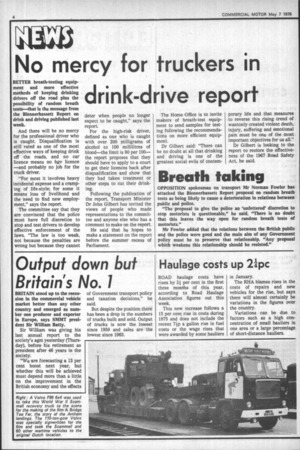ASX No mercy for truckers in drink-drive report
Page 6

If you've noticed an error in this article please click here to report it so we can fix it.
BETTER breath-testing equipment and more effective methods of keeping drinking drivers off the road plus the possibility of random breath tests—that is the message from the Blennerhassett Report on drink and driving published last week.
And there will be no mercy for the professional driver who is caught. Disqualification is still rated as one of the most effective ways of keeping drink off the roads, and no car licence means no hgv licence —and probably no job for the truck driver.
"For most it involves heavy incidental expense and a cramping of life-style; for some it means loss of livelihood and the need to find new employment," says the report.
The committee say that they are convinced that the police must have full discretion to stop and test drivers to develop effective enforcement of the laws. "The law is too weak, not because the penalties are wrong but because they cannot deter when people no longer expect to be caught," says the report.
For the high-risk driver, defined as one who is caught with over 200 milligrams of alcohol to 100 millilitres of blood—the limit is 80 per 100— the report proposes that they should have to apply to a court to get their licences back after disqualification and show that they had taken treatment or other steps to cut their drinking.
Following the publication of the report, Transport Minister Dr John Gilbert has invited the views of people who made representations to the committee and anyone else who has a comment to make on the report.
He said that he hopes to make a statement on the report before the summer recess of Parliament. The Home Office is to invite makers of breath-test equipment to send samples for testing following the recommendations on more efficient equipment.
Dr Gilbert said: "There can be no doubt at all that drinking and driving is one of the greatest social evils of contem porary life and that measures to reverse this rising trend of wantonly created violent death, injury, suffering and emotional pain must be one of the most important objectives for us all."
Dr Gilbert is looking to the report to restore the effectiveness of the 1967 Road Safety Act, he said.




























































































